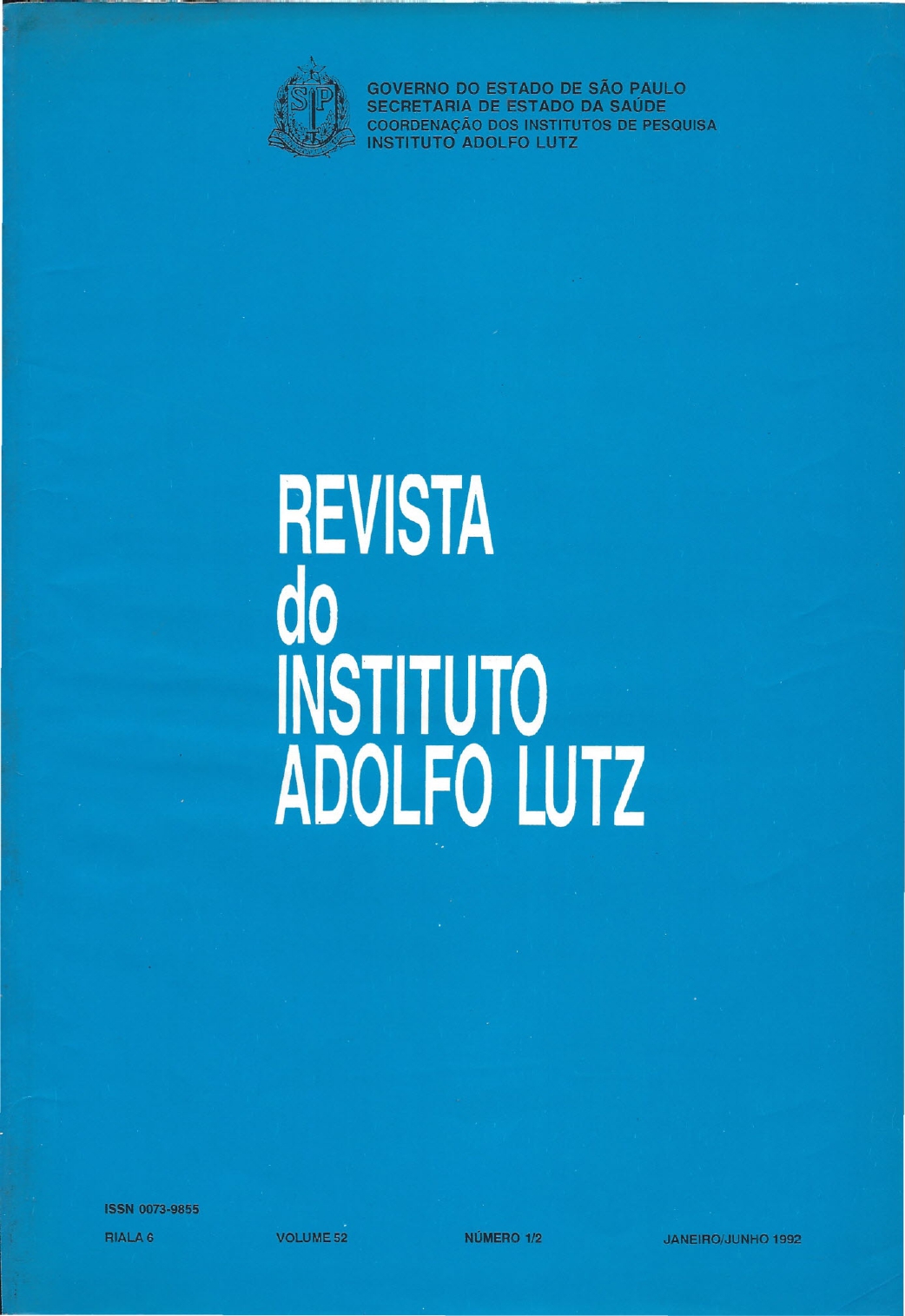Abstract
This study shows results about phages occurence (coliphages and shigellaphages) in 304 samples of drinking water, 9 of wastewater and 268 of not washed fresh green salads not related with viral human infections by enteric vírus and in 41 samples of water, 8 of not washed green salad and 41 samples of others food products (17 raw milk, 17 powedered products and 7 ready-to-eat products), collected in a municipality of São Paaulo during a infectious hepatitis outbreak. The percentage of phages positivity in the local where was occurring the outbreak was greater (20,63%) than the samples control (8,58% of green salad's samples and 7,57% of water's samples). Considering only well and spring water's samples (not clorinated) and green salads, it is observed that the posivity is 50% among the outbreak's samples and 8,58% among the control samples. All (100%) of the control group positivies samples showed colophges and 53,38% shigelIaphages. On the other hand, the samples related with the outbreak were 4615% positive for coliphages and 100% positives for shigellaphages. It is made some consideration about these results, discussing the role of fecal basteriophages as microbial indicator of fecal contamination and as indicator of others enteric virus' presence and its importance in the microbial evaluation of food products, including water.
References
2. APPLETON, H.; PALMER, S. R. & GILBERT, R. J. - Foodbome gastroenteritis of unknow aetiology: a virus infection? Brit. Med. J., 282: 1801 - 1802, 1981.
3. BANWART, G. J. - Basic Food Microbiology, 2nd ed. New York, Van Nostrand Reinhold, 1989, p. 89 - 92 e 274 - 278.
4. CLIVER, D. O.; ELLENDER, R. D. & SOBSEY, M. D. - Foodbome virus. In: SPECK, M. L. ed. - Compendium of methods for the microbiological examination of foods. 2nd. ed. New York, Amer. Pub. Health A., 1984. c. 39.
5. CLIVER, D. O.; O'NEILL, P. E. & KITCHENS, J. F. - Surveillance methods for viruses in foods. Milk Food Technol., 32: 421 - 425,1969.
6. DUTKA, B. J.; EI-SHAARAWI, A.; MARTINS, M. T. & SANCHES, P. S. - North and south American studies on the potential of coliphages as a water quality indicator. Water Res., 21: 1127 - 1l34, 1987.
7. EYLES, M. J.; DAVEY,C. R. &HUNTLEY, E. J. - Demonstration of viral contamination of oysters responsible for an outbreak of viral gastroenteritis. J. Food Protect, 44: 294 - 296, 1984.
8. HARTMAN, P. A.; PETZEL, J. P. & KASPAR, C. W. - New methods for indicator microrganisms. In: PIERSON, M. D. & STERN, N. J. – Foodborne microorganisms and their toxins: developing methodology. New York, MarceI Dekker, 1986, p. 200 - 201.
9. KENNEDY JR., J. E.; OBLINGER, J. L. & BITTON, G. - Recovery of coliphage from chicken, pork sausage and delicatessen meats. J. Foods Protect, 47: 623 - 626, 1984.
10. KONOWALCHUK, J. & SPEIRS, J. I. - Survival of enteric viruses on fresh vegetables. J. Milk Food Technol., 38: 469 - 472, 1975.
11. KOTT, Y.; ROSE, N.; SPERBER, S. & BETZER, B. - Bacteriophages as viral pollution indicators. Water Res., 8: 165 -171, 1974.
12. PEDRO, N. V.; KUSSUMI, T. A.; GELLI, D.S.; KAWANO, M. & SOUZA, A. – Aspectos higiênico-sanitários de águas de poços cavados em diferentes áreas socio-econômicas de São Paulo. Rev. Inst. Adolfo Lutz, 48: 21 - 27, 1988.
l3. SANDERS, A. C.; BRYAN, F. L. ; OLSON, J. C. & MADDEN, J. M. - Foodbome illness - suggested approaches for the analysis of foods and specimens obtained in outbreakes. In: SPECK, M. L. ed. Compendium of methods for the microbiological examination of foods, 2nd. ed. New York, Amer. Pub. Health A., 1984. c. 38.
14. SERRES, L.; AMARIGLIO, A. & PETRANXIENNE, D. - Contrôle de Ia Qualité des Produits Laitiéres. Analyse microbiologique et analyse sensorielle. ler. Groupe P. Bacteriophages. Issy - les - Moulineaux, Ministére de I' Agriculture, 1973. Tome 2.
15. STETLER, R. E. - Coliphages as indicators of enteroviruses. Appl. environ. Microbiol., 48: 668 - 670, 1984.
16. SULLIVAN, R.; PELLER, J. T.; TIERNEY, 1. T. & LARKIN, E. P. - Examination of oysters for enteroviruses. In: Bacteriological Analytical Manual, 6th. ed. Association of Official Analytical Chemists, 1984. c. 20.
17. WENTSEL,R. S.; O'NEILL,P.E. &KITCHENS, J. F. - Evaluation of coliphage detection as a rapid indicator of water quality. Appl. environ Microbiol., 43: 430 - 434, 1982.

This work is licensed under a Creative Commons Attribution 4.0 International License.
Copyright (c) 1992 Instituto Adolfo Lutz Journal
